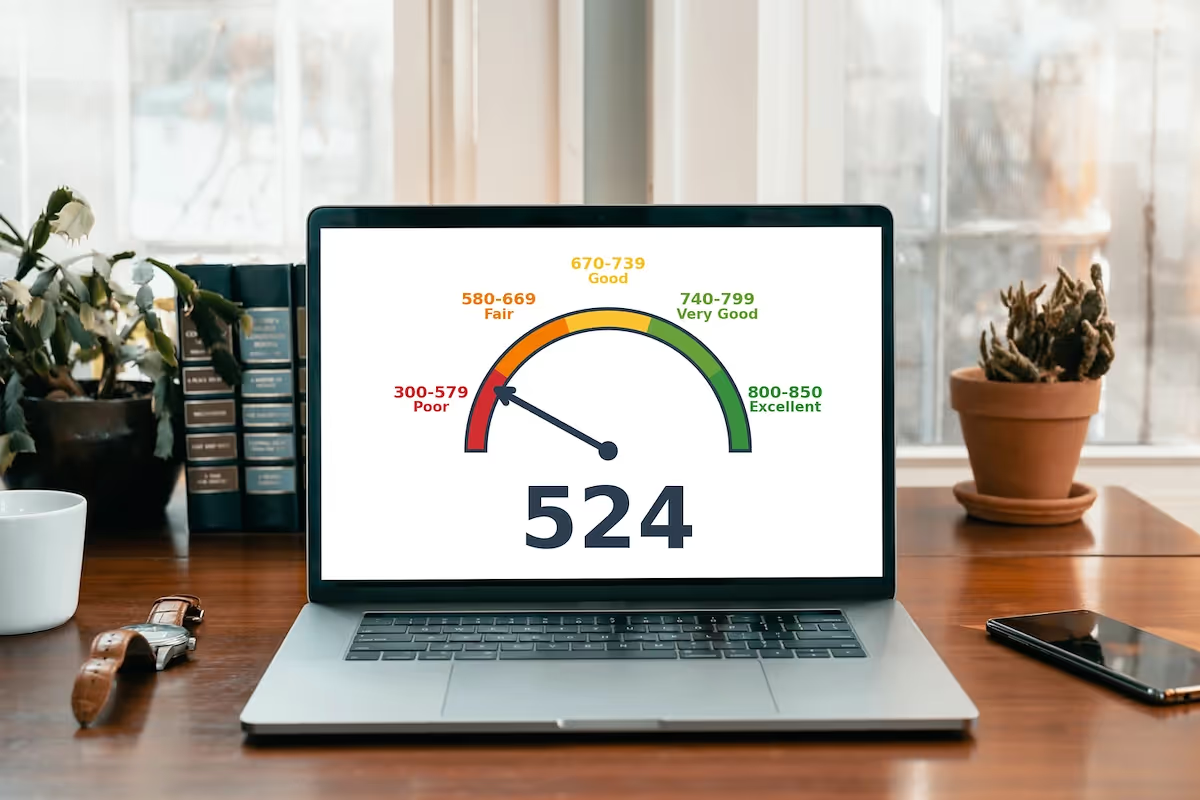
Kudos has partnered with CardRatings and Red Ventures for our coverage of credit card products. Kudos, CardRatings, and Red Ventures may receive a commission from card issuers. Kudos may receive commission from card issuers. Some of the card offers that appear on Kudos are from advertisers and may impact how and where card products appear on the site. Kudos tries to include as many card companies and offers as we are aware of, including offers from issuers that don't pay us, but we may not cover all card companies or all available card offers. You don't have to use our links, but we're grateful when you do!
524 Credit score: What You Need to Know in 2025
July 1, 2025


TL;DR
A 524 credit score is a foundational step on your financial journey, though it is considered below average. This score falls into the “Poor” category on the FICO scale, which highlights clear opportunities for growth and improvement.
What Does a 524 Credit Score Mean?
A 524 credit score places you in the "poor" category of the FICO scoring model, which ranges from 300 to 850. Lenders view a score in this range as a sign of high risk, suggesting a history of significant credit difficulties. As a result, you may find it challenging to get approved for new loans or credit cards, as financial institutions will be hesitant to extend credit.
This score can directly impact your financial life, often leading to higher interest rates and less favorable terms if you are approved for credit. While a 524 score presents considerable hurdles, it's not a permanent state. Think of it as a starting point; understanding where you stand is the first step toward building a stronger credit history and unlocking better financial options down the road.
Who Has a 524 Credit Score?
While a 524 credit score is below the average for any age demographic, there is a clear trend of scores increasing with age. Based on average credit scores by generation for 2023, the breakdown is as follows:
- Generation Z (ages 18-26): 680
- Millennials (ages 27-42): 690
- Generation X (ages 43-58): 709
- Baby Boomers (ages 59-77): 745
- Silent Generation (ages 78+): 760
Credit Cards With a 524 Credit Score
A credit score of 524 falls into the "poor" range, which can significantly hinder your ability to qualify for most traditional credit cards. Lenders generally view this score as an indicator of high risk, meaning you'll likely face rejections from mainstream card issuers. Your options will probably be limited to products specifically designed for building credit, such as secured cards, which often come with less favorable terms.
Kudos offers an AI-powered tool that helps you find the right credit card from a database of nearly 3,000 options. The tool provides personalized recommendations based on your preferences and financial goals, and even offers insights into how a new card might impact your credit score.
Auto Loans and a 524 Credit Score
A 524 credit score places you in the subprime category, which can make securing an auto loan more difficult and costly. Lenders view this score as a higher risk, often resulting in significantly higher interest rates compared to borrowers with better credit.
- Super-prime (781-850): 5.25% for new cars and 7.13% for used cars
- Prime (661-780): 6.87% for new cars and 9.36% for used cars
- Non-prime (601-660): 9.83% for new cars and 13.92% for used cars
- Subprime (501-600): 13.18% for new cars and 18.86% for used cars
- Deep subprime (300-500): 15.77% for new cars and 21.55% for used cars, based on a 2025 analysis.
Mortgages at a 524 Credit Score
With a 524 credit score, your mortgage options are quite limited, as conventional loans typically require a score of at least 620. Your most realistic path to homeownership is likely an FHA loan, which is government-backed and accepts scores as low as 500. However, because your score is below the 580 threshold, you will be required to provide a down payment of at least 10%.
A 524 credit score will also result in less favorable loan terms. Lenders will view you as a higher-risk borrower, which means you'll face higher interest rates and fees, such as more expensive mortgage insurance on an FHA loan. Expect to undergo a stricter manual underwriting process, where lenders will closely examine your income, debt, and overall financial stability beyond just your credit score.
What's in a Credit Score?
Figuring out what goes into your credit score can feel like trying to solve a complex puzzle, but the number is generally derived from a few key factors in your financial history.
- Your payment history is the most significant factor, reflecting whether you pay your bills on time.
- Credit utilization measures how much of your available credit you are currently using.
- The length of your credit history considers the age of your oldest and newest accounts, as well as the average age of all your accounts.
- Your credit mix looks at the different types of credit you have, such as credit cards, mortgages, and installment loans.
- New credit inquiries and recently opened accounts can also temporarily impact your score.
How to Improve Your 524 Credit Score
No matter your current standing, improving your credit score is always possible. While it takes time and consistent effort, taking the right steps can significantly boost your 524 credit score and improve your overall financial health.
- Monitor your credit reports. Regularly checking your reports from the three major bureaus via AnnualCreditReport.com helps you spot and dispute inaccuracies that could be unfairly lowering your score. This also allows you to track your progress and ensure your positive actions are being recorded correctly.
- Set up automatic bill payments. Your payment history is the single most important factor in your credit score, so ensuring every bill is paid on time is critical. Automating payments prevents missed or late payments, which are often a key reason for a low score, and helps build a positive history.
- Lower your credit utilization ratio. This ratio, which is how much of your available credit you're using, is the second-most influential factor in your score. Aim to keep your balances below 30% of your credit limit to show lenders you can manage debt responsibly.
- Become an authorized user. Being added to the credit card of someone with a long, positive credit history can add their good habits to your credit file. This can help lengthen your credit history and lower your overall utilization, providing a valuable boost to a lower score.
Using a tool like Kudos can help you use your cards more strategically to maximize rewards while you work on improving your credit.
Unlock your extra benefits when you become a Kudos member

Turn your online shopping into even more rewards

Join over 400,000 members simplifying their finances

Editorial Disclosure: Opinions expressed here are those of Kudos alone, not those of any bank, credit card issuer, hotel, airline, or other entity. This content has not been reviewed, approved or otherwise endorsed by any of the entities included within the post.



































.webp)



.webp)



.webp)

